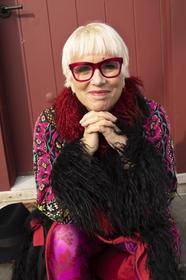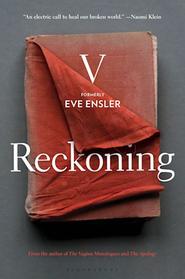
|
|
| (photo: Paula Allen) | |
V, formerly known as Eve Ensler, is a Tony Award-winning author and playwright, a ferocious feminist voice and founder of V-Day and One Billion Rising, and co-founder of City of Joy. Her play The Vagina Monologues has been published in 48 languages and performed in more than 140 countries. She is one of Newsweek's "150 Women who Changed the World" and the Guardian's "100 Most Influential Women." She lives in New York. Reckoning (Bloomsbury, reviewed in this issue) resulted from V's review and curation of her life's work.
Reckoning brings together decades of your writing in one volume. How did you decide which poems, articles, monologues and short stories to include? How did you decide which to leave on the cutting-room floor?
It was a very intense editing process as there was so much writing to review. I was so lucky to have my dear friend Paula Allen by my side, who spent many hours reading through many manuscripts and journals. But books are strange and miraculous creatures. Reckoning began to organize itself. There would suddenly be three or four strong pieces written during the period of the AIDS epidemic, or several pieces where walls--the building of them, the tearing down of them--revealed themselves as a chapter. And of course it was about the writing--which pieces held up over time, which sat well with the other pieces.
 You often describe words as your allies; they freed you and welcomed you and saved you. Do you find that one medium--plays, novels, poetry, etc.--is more effective for you than another?
You often describe words as your allies; they freed you and welcomed you and saved you. Do you find that one medium--plays, novels, poetry, etc.--is more effective for you than another?
Every situation, season, event and moment calls for its own particular form of response. Sometimes a rant, sometimes a prayer, sometimes a five-year dive into the life of a freegan. I think the work of the artist is to keep being open and then even more open to that call and to following the path of the response.
One line that caught me by surprise was, "I am thinking or maybe I am unable to think, caught inside the ongoing mindfuck of this century." This book is an attempt to escape that mindfuck, and it's one many of us--whether writers and thinkers or not--feel trapped within, too. What guidance do you have for those of us who feel, as you write, "unable to think"?
If you think about the whole uber story, it's almost impossible to function: the morbid inequality of wealth, the serious backlash against women's bodies physically and legally, the desecration of our earth, the hatred against those bravely and brilliantly expanding gender boundaries, the devastating global impact of capitalism, rise of fascism and hate, and a disposable work force... and, and, and. All of it seems utterly impossible and crushing. But one person, one project, one action, one moment, one thought--you can affect, can change, can lift, can make better. I remind myself constantly to stay in this room, in this moment with these people. Here I can love. Here. Presence is magic.
In a post-Roe world, what place do you believe women's writing has in this reality? What good can it do? As the author of some of the most celebrated feminist works of all time, what have you discovered women's writing has the power to do?
I have not conceded yet to the idea that we are in a post-Roe world. I believe we are in a liminal state, and things can be reversed. Congress can still pass legislation to codify abortion rights.
I think writing is one of the most powerful political tools we have. It can educate people and inspire them and provoke them and allow them to see that they are not alone and that they are part of the majority of people who stand for abortion rights. Plays, poems, novels, monologues, stories change people and give them courage. They weave them into a vital human collective fabric. I can think of so many works of literature and pieces of theater that literally saved my life or turned it in a completely new direction.
We are witnessing an extraordinary pushback against feminism, to the point that any work with a "feminist bent" is written off by large groups of men and women alike. Does this trouble you?
Of course it troubles me, but I have been at this for so long it feels familiar in ways. When I first became known for The Vagina Monologues, men and women alike were threatened by the word "vagina" because it forced them to reckon with their own assumptions, buried desires, shame, whatever. I think we are seeing a bit of that now, too. We are a society that is being forced to reckon with what we have already done and where we are headed, and that is deeply uncomfortable. When there is discomfort, people want to take back control and they usually start with women. My writing is an invitation for people to break through what they think they know and go deeper. I don't ever go after an audience, but I try to create a world within my writing that makes it possible for the reader/audience member to find their own way in.
Like so much of your work, Reckoning is a call to action. In your opinion, what does effective action look like? Surely it can't begin and end with reading this book. What do you want readers of this book to do?
Action is the critical piece. It can come in so many forms: a commitment to a daily act of great generosity marching and dancing in the streets, being in solidarity with those who are vulnerable, supporting those in struggle financially, emotionally, politically, planting trees, defending the earth against pipelines, making art that transforms consciousness, giving what you need the most, going out of your comfort zone to stand for people and things you believe in, working to transform a system of diabolical inequality rather than stepping over people to rise in it.
A great deal of Reckoning is about pain. But this book is also incandescent with joy. How do you continue to find joy in your communities of women, even when reality itself seems set against them?
I have had the astounding privilege to travel this world and know--and I mean truly know--some of the most astounding women in the world. Women who wake up every morning and devote their lives to turning pain to power and magic. These women are women who have survived the worst atrocities and violence and poverty and racism, and still they give every fiber of their beings to transforming suffering. To know them, to be in a movement with them is to know joy, sisterhood, love and possibility. To witness young women who come to City of Joy in the Congo, to watch them come broken and lost and hopeless and then to see them, six months later, after being loved and nurtured and educated. To see how beautiful and powerful and joyful they have become, to see the leaders they have become, to know this is possible and you had a small hand in making this happen... well, what could possibly feel better? --Lauren Puckett-Pope, freelance writer

